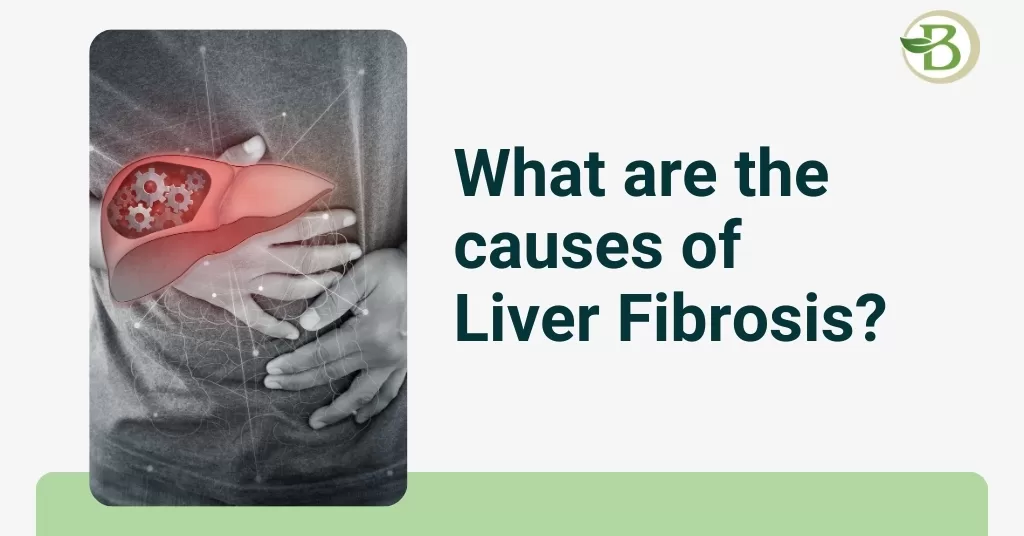Liver Fibrosis: A Silent Threat
Your liver is one of your body’s most significant and most vital organs. It is often dubbed the body’s chemical factory since it performs over 500 chemical functions. But what happens when this crucial organ begins to malfunction due to fibrosis? Liver fibrosis, a condition that silently creeps in, can have profound implications for one’s health.
Understanding the formation of liver fibrosis (also called hepatic fibrosis), its implications, and the potential treatments available is crucial for maintaining general well-being.
This blog aims to elucidate the formation and causes of liver fibrosis, explore the effectiveness of homeopathic treatments, and highlight Bharat Homeopathy’s contributions to treating this condition.
Liver Fibrosis: What is it?
Liver fibrosis is a medical condition characterised by the excessive build-up of scar tissue in the liver. It is not a disease but a result of various conditions that cause continuous inflammation and damage to liver cells (hepatocytes).
Scar tissue cells, unlike healthy cells, are incapable of self-repairing or functioning. The scar tissue replaces healthy cells in the liver, disrupting its ability to perform essential functions such as detoxification, metabolism, and production of essential proteins. Additionally, fibrosis-related scar tissue may restrict or obstruct the liver’s blood supply. This may cause further scar tissue, ultimately destroying healthy cells.
If not treated, this condition can advance to liver cirrhosis, failure, and even cancer. Therefore, diagnosing and managing hepatic fibrosis early is important to prevent further damage and complications.
Stages and Formation:
Liver fibrosis refers to the buildup of scar tissue, which can occur due to long-term liver disease. It progresses through several stages:
- Stage 1 (Mild Fibrosis): There is a small amount of scar tissue in this early stage. It starts to form around the liver’s blood vessels but does not interfere much with its function.
- Stage 2 (Moderate Fibrosis): More scar tissue develops and begins to spread. The scar tissue starts to affect blood flow within the liver, but can still function relatively well.
- Stage 3 (Severe Fibrosis): Significant scarring occurs, and the fibrous tissue bridges between different areas of the organ. This stage can cause noticeable problems with its function and blood flow.
- Stage 4 (Cirrhosis): Extensive scarring and organ damage. The organ’s structure is severely altered, leading to severe impairment in its ability to function. Cirrhosis further can lead to liver failure and other severe health complications.
Understanding these stages of liver fibrosis can help recognise the progression of the disease and the importance of early diagnosis to prevent further damage.
Causes:
Numerous factors can cause or contribute to the formation of scar tissue:
- Viral Hepatitis: On-going infection with hepatitis B or C viruses is a leading cause of liver fibrosis. These viruses induce an immune response that leads to inflammation and subsequent fibrosis.
- Alcohol Abuse: Chronic excessive alcohol consumption is a significant risk factor for hepatic fibrosis. Alcohol metabolism produces toxic byproducts that damage liver cells and promote inflammation and fibrogenesis.
- Non-Alcoholic Fatty Liver Disease (NAFLD): This condition is defined by fat accumulation in liver cells, which can result in inflammation and fibrosis. NAFLD is frequently linked to obesity, diabetes, and metabolic syndrome.
- Autoimmune Hepatitis: An autoimmune response where the body’s immune system attacks healthy cells, causing inflammation and fibrosis.
- Genetic Disorders: Hemochromatosis (excessive iron accumulation) and Wilson’s disease (copper accumulation) can damage and scar organ tissue.
- Chronic Bile Duct Blockage: This condition occurs when there is a continuous blockage of the bile ducts, preventing bile from flowing from the liver to the small intestine, resulting in bile accumulation, inflammation and scarring of the tissue.
Symptoms:
You won’t notice any signs of liver fibrosis in its early stages. However, as the condition progresses, some symptoms may develop. These can include:
- Fatigue
- Weakness
- Loss of appetite
- Unintended weight loss
- Jaundice (yellowing of the skin and eyes)
- Abdominal swelling or pain
- Swelling in the legs and ankles
- Itchy skin
- Easy bruising
- Spider-like blood vessels on the skin
- Dark urine
- Pale-colored stools
However, many of these symptoms of fibrosis of the liver can also indicate other conditions or health issues. Therefore, if you’re experiencing any of the above-listed symptoms, it’s crucial to consult a hepatologist for an accurate diagnosis and appropriate treatment.
Can it be reversed?
Absolutely! Many people are concerned about liver fibrosis, and it’s natural to wonder if it can be reversed. The good news is that reversing hepatic fibrosis is indeed possible, and Homeopathy offers a promising solution. Homeopathy, a system of natural medicine, is a comprehensive approach to healing that focuses on stimulating the body’s natural healing abilities. By using carefully selected remedies, homeopathy aims to address the underlying causes of the formation of scar tissue, promote the regeneration of healthy tissue and halt the progression of the disease.
Homeopathic medicines are designed to:
- Support liver detoxification
- Reduce Inflammation
- Alleviate symptoms
- Enhance Regeneration
- Prevent further damage
- Improve overall organ health
Homeopathic medicines for liver fibrosis stand out from conventional medicine by being safe, gentle, and natural. Unlike surgical treatments, which can be costly and have unwanted adverse effects, homeopathic treatment for liver fibrosis is noninvasive and tailored to each individual’s unique symptoms and overall health. It considers the individual’s physical, mental, and emotional well-being, providing a comprehensive approach to healing. With the right homeopathic treatment plan, hepatic fibrosis can be reversed, allowing individuals to regain their health and vitality.
Treatment at Bharat Homeopathy
If you or a loved one are seeking liver fibrosis treatment, Bharat Homneopathy is here for you. With a patient-centric approach and commitment to recovery, Bharat Homeopathy has emerged as a leader in the homeopathic treatment of hepatic fibrosis. We offer safe, holistic, and personalised care to address your specific needs. Our experienced team of homeopathic practitioners understands the complexities of the formation of scar tissue and provides comprehensive treatment plans tailored to each individual.
At Bharat Homeopathy, we prioritise your well-being and aim to support your organ health through natural liver fibrosis medication and lifestyle modifications. Our approach combines traditional homeopathic principles with modern scientific understanding, ensuring you receive the best care.
To begin your journey towards improved liver health, we invite you to schedule a consultation with our experts. Contact Bharat Homeopathy today to take the first step towards a healthier future.


